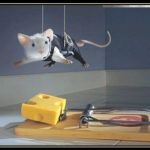 I’ve written a few times in recent times about the innate courage in the innovator. To innovate often requires the individual to stand alone, often against quite significant foes, in order to get their ideas and thoughts out there. It’s a tough job, especially as so many of our organizations are set up with efficiency in mind, so the status quo is very much what they’re looking to protect.
I’ve written a few times in recent times about the innate courage in the innovator. To innovate often requires the individual to stand alone, often against quite significant foes, in order to get their ideas and thoughts out there. It’s a tough job, especially as so many of our organizations are set up with efficiency in mind, so the status quo is very much what they’re looking to protect.
It was interesting therefore to read a recent study published by the University of Colorado, Boulder, in which they explore the kind of thoughts and deliberations we go through before engaging in a courageous act.
It found that when deciding on whether to stick our heads above the parapet, we first attempt to understand how personally responsible we are for the thing we’re concerned about. We also try and gauge our personal level of attachment to the issue, and the power we have to do something about it.
Once these have been established, the study then suggests that people begin weighing up the costs involved of acting courageously. They’ll begin assessing things like their job security and professional relationships. The interesting thing is that most people tend to progress with their courageous act despite these costs, which is pleasing to hear.
“What’s surprising about the findings is that they tell us courage is not just a personality trait, it’s a behavior that can be learned,” the authors say. “Also, courage is very social. You compare yourself with the people around you and ask, ‘Do I identify with the victim, or am I more powerful than the other people?'”
The study went on to suggest that there are four key types of courage that typically emerge in the workplace:
- Standing up to authority
- Uncovering mistakes
- Protecting those in need
- Taking a stance on a problem that has no clear solution
Interestingly, of those four types of courage, far and away the most common was standing up to authority. Equally interesting was that it also saw the recipients suffer the most as a result. It’s worth noting that in this context, authority is one person. Imagine what it’s like standing up against a whole community.
The researchers conclude by highlighting the crucial role the courageous types that speak up play in ensuring our organizations stay honest and true to themselves.
“Managers might better grasp the significance of our findings by thinking of courageous workplace behaviors as a type of organizational immune response that identifies and corrects power abuses, errors, ambiguity and needs before they metastasize and threaten the system as a whole,” they say.
Interesting stuff. It must really help if there are a few like minded souls in your org that you can at least rely on for support. Being a sole voice of dissent would be very lonely.
Indeed Ray. I'm not sure a solitary voice in an organisation can have much hope of changing things too much (sadly).
Does support from external sources matter as much as support from internal sources I wonder?
I suspect the main criteria for most people is 'will this thing get me bollocked'
Interesting that standing up to the status quo isn't listed by the researchers isn't it? Does that suggest that it doesn't happen very often?
Quite possibly Paul. It's either that or they didn't see it as an issue. The research suggests it's more likely to be the former than the latter.